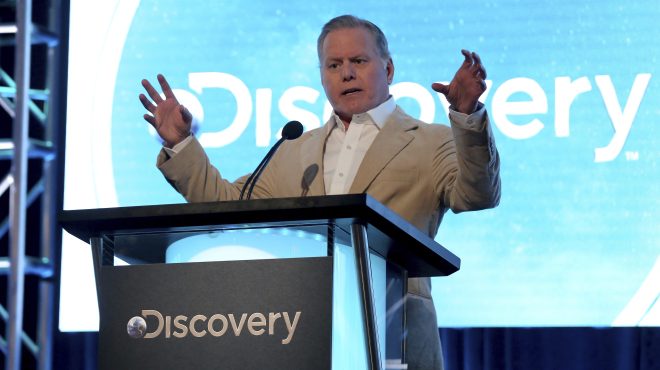David Zaslav is a busy man, but I think he would benefit from a meeting with Alfred Hitchcock . They had this in common: Facing cycles of disruption, each decided to call a “time out” to gain perspective and design new strategies. And both likely would have enjoyed their interaction.
As CEO of Warner Bros Discovery, Zaslav is the center of the storm as he comes to terms with what he views as “the new reality. ” Confronted by stalemate on many fronts, Hitchcock, too, took his pause to restore order. “I was prepping Psycho in 1960 when it hit me that the game had changed but no one had set forth the new rules,” Hitchcock once told me.
“The whole industry seemed to come to a halt. After a long layoff I decided to radically cut costs, shoot my movie in black and white with a small TV crew and shift to entirely new locations. Whatever the new budgetary constraints, I was ready to meet them.
” Related Story David Zaslav Talks DC “Ten Year Plan” In Wake of ‘Batgirl’ Axing; ‘Flash’ Still On Track For Release His home studio, Universal, had decreed that Psycho would be a scary departure from the Hollywood norm. It was, and the studio itself was scared of reaction to the famous shower scene, but Psycho turned out to be a big hit. Hitchcock learned shortly thereafter that Universal was about to be sold to Lew Wasserman, a powerful agent, who would now focus resources on television.
He promptly amped up his own suspenseful TV series, also a hit. To Hitchcock, who died in 1980, the Psycho pivot vividly reflected the moment when the business of filmmaking seemingly had lost its way. Reviewing it with me years later over a series of meals and screenings, Hitchcock recalled the panic among filmmakers who now understood that the movie audience had drifted to television.
The managements of one studio after another were collapsing. An entire generation of leaders was in retreat. Sixty years post Psycho , a version of this scenario is recurring as Hollywood struggles through another chapter of disruptive change.
The CEO of Warner Bros Discovery has recently completed his “gap year” – the mandated lull between his official takeover of key segments of the former AT&T empire and the moment when he actually implements his decisions. Surely this is an ideal time to assemble some Hitchcockian perspective. Zaslav presently finds himself staring at a sea of daunting data: content write-offs approaching $500 million and another $330 million in development write-offs plus $200 million representing personnel turnover.
Translated into titles, this entails the termination of several active productions like Batgirl . The launch of a free, ad-supported streaming service would also be on the boards with the aim of reaching a total of 130 million paid subscribers by 2025 – ambitious goals in a bumpy economy with ad spending heading south. Despite rising churn and cord-cutting, Disney+ optimistically predicted 260 million subscribers by September 2024, lately scaling it back to between 215 million and 245 million (the company’s theme park division continues to expand).
But for WBD, a cloud of debt will also have to be confronted – it totaled $55 billion when AT&T’s WarnerMedia division was combined with Discovery. The company presently expects to generate a $3 billion cash flow in 2022 and to have repaid $6 billion in debt by the end of August. This exercise has nurtured a new lexicon of corporate “right-sizing,” embracing the likes of “synergy realization” and “content engineering.
” Had Zaslav’s career reached its zenith back in the Hitchcock era, the numbers confronting him would have seemed trivial, but the problems still ominous. From Hitchcock’s perspective, one issue was simple fatigue. Hollywood had long been feeding off the energy of a generation of showmen who were now in decline.
Walt Disney’s attention had shifted from animation to visions of the future – planned communities like Epcot or futurist exhibits at the World’s Fair. He’d also become grumpy about union activism and divisive politics. An exiled Darryl Zanuck, meanwhile, had become exasperated with his bankers (and they with him) and even Jack Warner was contemplating the sale of his Warners stake.
Studios like Paramount, MGM and Fox were essentially dysfunctional. Meanwhile, free-wheeling independents like Samuel Goldwyn and Sam Spiegel also were succumbing to age and mounting costs. Defying all this, some extraordinary films were still being made – achievements like Lawrence of Arabia , Doctor Zhivago and The Longest Day .
Their budgets were extravagant for the time, and none embodied the key demands of current studios: No sequel possibilities and no franchise continuum. The movies were still generating public attention, but most of the publicity was about scandal or disruption – runaway productions like Cleopatra or Mutiny on the Bounty . Even as the older generation of studio chiefs was preparing for retirement – forced or voluntary – they still angrily resisted the brash new cycle of films that would later define the next generation: Bonnie & Clyde , The Graduate and Midnight Cowboy .
It would take a while before Hollywood seemed able to recharge its batteries – longer than a “gap year. ”.
From: deadline
URL: https://deadline.com/2022/08/peter-bart-david-zaslav-warner-bros-discovery-1235090086/



